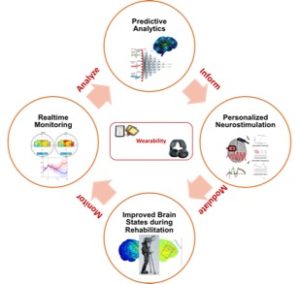N-HANCE (Neurotechnology for Human AugmeNtation in Critical Environments)
Sponsor: TAMU, TEES
 Advances in cyber-human systems, e.g., brain-computer interfaces (BCIs), have expanded knowledge of, and support for, human cognition in various educational, work, and health domains. In particular, BCIs have the potential to fundamentally improve the performance of first responders, such as firefighters, who often perform risky operations in life-threatening stressful circumstances. Stress significantly disrupts (i.e., alters and inhibits) neural pathways of cognitive and motor capabilities, resulting in cognitive deficits (e.g., inattention, memory impairments), which ultimately leads to poor situation awareness, impaired decision-making, or increased psychomotor errors. Current user interfaces leverage multimodal feedback and displays to support cognition by facilitating information processing and communication, however, augmentation paradigms to tackle cognitive deficits directly at the source, i.e., the brain, may prove more effective but have been poorly explored. We will develop closed-loop BCIs using fNIRS and tDCS (N-HANCE: Neurotechnology for Human AugmeNtation in Critical Environments) to augment and support cognition under stress in VR-simulated emergency response tasks.
Advances in cyber-human systems, e.g., brain-computer interfaces (BCIs), have expanded knowledge of, and support for, human cognition in various educational, work, and health domains. In particular, BCIs have the potential to fundamentally improve the performance of first responders, such as firefighters, who often perform risky operations in life-threatening stressful circumstances. Stress significantly disrupts (i.e., alters and inhibits) neural pathways of cognitive and motor capabilities, resulting in cognitive deficits (e.g., inattention, memory impairments), which ultimately leads to poor situation awareness, impaired decision-making, or increased psychomotor errors. Current user interfaces leverage multimodal feedback and displays to support cognition by facilitating information processing and communication, however, augmentation paradigms to tackle cognitive deficits directly at the source, i.e., the brain, may prove more effective but have been poorly explored. We will develop closed-loop BCIs using fNIRS and tDCS (N-HANCE: Neurotechnology for Human AugmeNtation in Critical Environments) to augment and support cognition under stress in VR-simulated emergency response tasks.
Collaborators: TAMU (McDonald), Drexel University (Ayaz)
Mechanisms of Neuromuscular Fatigue
Sponsor: NIH
Obesity is associated with decreased functional mobility and increased falls risk among adults over 65 years, especially in women. The project will identify the central (neural) mechanisms that contribute to the reduction in motor function (decreased strength and increased limb fatigability) that occurs with obesity in older men and women. We will utilize a variety of non-invasive integrated approaches (fNIRS and TMS as well as a dynamic fatigue protocol) to probe the central nervous system in order to examine obesity and sex differences in neural control. Findings will help identify subgroups of older adults who are more vulnerable to declines in functional mobility. Knowing the relative contributions of neural and muscular mechanisms of motor function will aid in developing targeted novel strategies to offset motor declines and functional mobility in older and vulnerable older adults.
Collaborators: Marquette University (Hunter)

